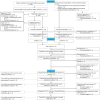Internet-administered, low-intensity cognitive behavioral therapy for parents of children treated for cancer: A feasibility trial (ENGAGE)
- PMID: 36404407
- PMCID: PMC10028033
- DOI: 10.1002/cam4.5377
Internet-administered, low-intensity cognitive behavioral therapy for parents of children treated for cancer: A feasibility trial (ENGAGE)
Abstract
Background: Parents of children treated for cancer may experience mental health difficulties, such as depression and anxiety. There is a lack of evidence-based psychological interventions for parents, with psychological support needs unmet. An internet-administered, guided, low-intensity cognitive behavioral therapy-based (LICBT) self-help intervention may provide a solution.
Methods: The feasibility and acceptability of such an intervention was examined using a single-arm feasibility trial (ENGAGE). Primary objectives examined: (1) estimates of recruitment and retention rates; (2) feasibility and acceptability of data collection instruments and procedures; and (3) intervention feasibility and acceptability. Clinical outcomes were collected at baseline, post-treatment (12 weeks), and follow-up (6 months).
Results: The following progression criteria were met: sample size was exceeded within 5 months, with 11.0% enrolled of total population invited, study dropout rate was 24.0%, intervention dropout was 23.6%, missing data remained at ≤10% per measure, and no substantial negative consequences related to participation were reported. Intervention adherence was slightly lower than progression criteria (47.9%).
Conclusion: Findings suggest an internet-administered, guided, LICBT self-help intervention may represent a feasible and acceptable solution for parents of children treated for cancer. With minor study protocol and intervention modifications, progression to a pilot randomized controlled trial (RCT) and subsequent superiority RCT is warranted.
Keywords: anxiety; cancer; cognitive behavioral therapy; depression; internet-based intervention; parents.
© 2022 The Authors. Cancer Medicine published by John Wiley & Sons Ltd.
Conflict of interest statement
Declaration of interest: none.
Figures

Similar articles
-
The acceptability and feasibility of an internet-administered, guided, low-intensity cognitive behavioural therapy intervention for parents of children treated for cancer: findings from a qualitative study involving public contributors.BMC Psychiatry. 2025 May 16;25(1):499. doi: 10.1186/s12888-025-06897-y. BMC Psychiatry. 2025. PMID: 40380335 Free PMC article.
-
Involving parents of children treated for cancer in Sweden as public contributors to inform the design and conduct of an evaluation of internet-administered self-help for parents of children treated for cancer: a protocol.Res Involv Engagem. 2024 Jan 2;10(1):2. doi: 10.1186/s40900-023-00532-4. Res Involv Engagem. 2024. PMID: 38167254 Free PMC article. Review.
-
Engagement With an Internet-Administered, Guided, Low-Intensity Cognitive Behavioral Therapy Intervention for Parents of Children Treated for Cancer: Analysis of Log-Data From the ENGAGE Feasibility Trial.JMIR Form Res. 2025 Jan 28;9:e67171. doi: 10.2196/67171. JMIR Form Res. 2025. PMID: 39874575 Free PMC article.
-
Study protocol for a feasibility study of an internet-administered, guided, CBT-based, self-help intervention (ENGAGE) for parents of children previously treated for cancer.BMJ Open. 2018 Jun 14;8(6):e023708. doi: 10.1136/bmjopen-2018-023708. BMJ Open. 2018. PMID: 29903802 Free PMC article.
-
Opt-out rates and reasons for non-participation in a single-arm feasibility trial (ENGAGE) of a guided internet-administered CBT-based intervention for parents of children treated for cancer: a nested cross-sectional survey.BMJ Open. 2022 Apr 1;12(4):e056758. doi: 10.1136/bmjopen-2021-056758. BMJ Open. 2022. PMID: 35365530 Free PMC article. Clinical Trial.
Cited by
-
E-therapists' views on the acceptability and feasibility of an internet-administered, guided, low-intensity cognitive behavioural therapy intervention for parents of children treated for cancer: A qualitative study.Digit Health. 2024 Jun 5;10:20552076241260513. doi: 10.1177/20552076241260513. eCollection 2024 Jan-Dec. Digit Health. 2024. PMID: 38846368 Free PMC article.
-
An mHealth Intervention to Improve Guardians' Adherence to Children's Follow-Up Care for Acute Lymphoblastic Leukemia in Tanzania (GuardiansCan Project): Protocol for a Development and Feasibility Study.JMIR Res Protoc. 2023 Aug 2;12:e48799. doi: 10.2196/48799. JMIR Res Protoc. 2023. PMID: 37403706 Free PMC article.
-
Use and Engagement With Low-Intensity Cognitive Behavioral Therapy Techniques Used Within an App to Support Worry Management: Content Analysis of Log Data.JMIR Mhealth Uhealth. 2024 Jan 10;12:e47321. doi: 10.2196/47321. JMIR Mhealth Uhealth. 2024. PMID: 38029300 Free PMC article.
-
The acceptability and feasibility of an internet-administered, guided, low-intensity cognitive behavioural therapy intervention for parents of children treated for cancer: findings from a qualitative study involving public contributors.BMC Psychiatry. 2025 May 16;25(1):499. doi: 10.1186/s12888-025-06897-y. BMC Psychiatry. 2025. PMID: 40380335 Free PMC article.
-
Involving parents of children treated for cancer in Sweden as public contributors to inform the design and conduct of an evaluation of internet-administered self-help for parents of children treated for cancer: a protocol.Res Involv Engagem. 2024 Jan 2;10(1):2. doi: 10.1186/s40900-023-00532-4. Res Involv Engagem. 2024. PMID: 38167254 Free PMC article. Review.
References
Publication types
MeSH terms
Associated data
LinkOut - more resources
Full Text Sources
Medical
Miscellaneous

